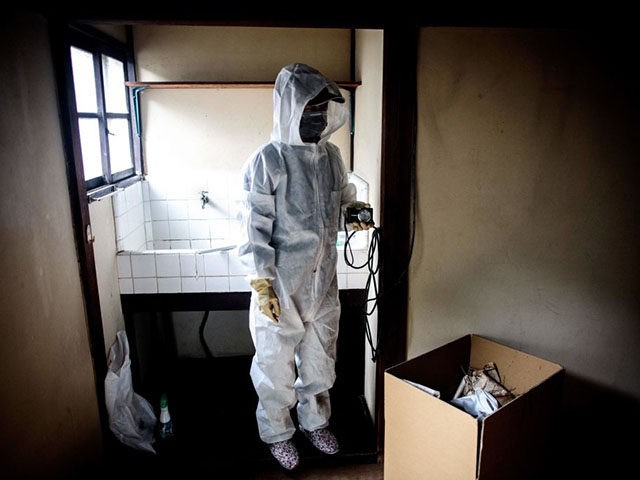A grim report from Japan’s Asahi Shimbun on Thursday told the stories of people who died alone and went undiscovered for up to six months because the Wuhan coronavirus pandemic eliminated their social interactions.
The problem of kodokushi, or “lonely death,” long predates the coronavirus, having gained some attention from Japanese media in the 1990s as low birth rates caused the population to age dramatically. Japan has a wildly imbalanced ratio of elderly to young, and many of the elderly have no children. A thriving industry developed to respectfully and thoroughly clean up their undiscovered remains.
That industry is booming during the pandemic, as cleaning service manager Kamesawa Noriyuki told Asahi Shimbun while “the pungent smell of rot” wafted from the latest apartment his company was hired to clean:
“It is clear that their social interactions have been cut off,” said Kamesawa. The body of the 67-year-old man who had lived alone in the apartment was found about two weeks prior.
It was badly decomposed due to the hot and humid conditions during the rainy season, and his cause of death was unknown. His death appeared to have gone unnoticed for about a month.
“I think he had lost the will to live,” said the deceased’s son, 36, who observed the cleaning process.
Japanese officials say the number of kodokushi discoveries is hitting all-time highs, while Kamesawa said his business volume has quintupled during the pandemic. Evidence suggests some of the lonely dead had not left their homes since early in the coronavirus crisis.
The Japanese government has announced some measures to cope with the problem, including Prime Minister Suga Yoshihide appointing a literal Minister of Loneliness, cabinet member Sakamoto Tetsushi, in February.
Sakamoto noted that South Korea is dealing with a similar surge of lonely deaths, while the British government appointed a Minister of Loneliness in 2018 under Prime Minister Theresa May. Loneliness ministries have generally focused on suicide prevention and combating depression until the pandemic dramatically increased the problem of people simply dying alone and unnoticed.
“I felt anew that Japan’s policies against loneliness and isolation are gathering attention as the world suffers due to the coronavirus. I’d like to think about how Japan can deliver its message so that its countermeasures become an example for the world to follow,” he said in May.
Asahi Shimbun noted that not all of the lonely dead have been completely abandoned by family, or found themselves without any family due to Japan’s cratering birth rates. One woman said she was exchanging online messages with her 64-year-old father before he died in May, but it still took three weeks before his remains were discovered, and even then his body was only found because his two small dogs barked loudly enough to annoy his neighbors.
“I never thought I’d see someone close to me die a solitary death. I thought I would only see such cases on TV. If I had been in contact with him a little more, I could have found him earlier,” the man’s daughter said.
South Korea’s lonely dead, or godoksa, skewed surprisingly younger than their Japanese counterparts before the pandemic. A substantial majority of them were men between the ages of 45 and 65. Their numbers swelled by nearly 80 percent between 2012 and 2018, possibly due to rising unemployment and job opportunities obliging them to relocate away from their hometowns and live alone.
South Korea also has a persistent social problem with younger men who shut themselves off from all human contact for months on end, a group they describe with the borrowed Japanese term hikikomori. Some of them voluntarily isolate for so long that they forget how to interact with other people, requiring extensive therapy to regain basic social skills. The phenomenon is hardly unknown to Western societies, but it is considerably more widespread in Asia, especially in large cities where complete isolation in small apartments is easily achieved thanks to delivery services.
The South Korean government responded to the godoksa surge by offering lonely people coupons for public services to get them out of the house, forming little neighborhood friendliness platoons to offer them regular social contact, and offering to install free-motion detectors for low-income housing so social workers could be dispatched if the residents stopped moving.
As in Japan, the number of lonely or “unrelated” dead in South Korea surged during the pandemic, prompting churches to hold mass commemoration services in their honor.
Japanese and South Korean officials believe the pandemic caused a spike in suicides among young women, although both governments are still conducting research to establish accurate numbers. These suicides are often numbered among the kodokushi and godoksa because the socially isolated victims are not quickly missed.
Coronavirus lockdowns have been associated with increased thoughts of suicide around the world, but a higher percentage appears to have translated those thoughts into action in the two Asian nations, which already had high suicide rates. Japanese suicide hotlines say their lines have been so jammed during the pandemic that only 40 percent of calls are getting through.
Japanese experts postulate that young women form a high percentage of employees in the industries hit hardest by the pandemic — including travel, retail sales, and food service — so they are despondent over job and income losses, and psychologically scarred from losing jobs that gave them a great deal of contact with other people.

COMMENTS
Please let us know if you're having issues with commenting.